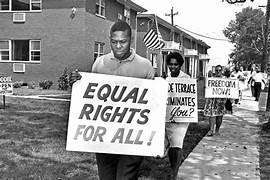On October 21, 1958, the United States was in the midst of a transformative period in its history as the Civil Rights Movement gained momentum in the fight for racial equality and justice. This pivotal era saw significant advancements and milestones in the struggle to dismantle segregation and secure civil rights for African Americans.
During the 1950s, segregation was deeply entrenched in American society, particularly in the Southern states. African Americans faced systemic discrimination and were denied basic rights and opportunities solely based on their race. However, the Civil Rights Movement emerged as a powerful force challenging the status quo and demanding change.
On October 21, 1958, a significant event occurred in the Civil Rights Movement when a federal court ordered the immediate admission of Autherine Lucy, an African American woman, to the University of Alabama. This ruling marked a historic victory against segregation in education and set an important precedent for future desegregation battles.
Autherine Lucy's journey to attend the University of Alabama was met with fierce opposition and resistance. Despite being accepted to the university, she was initially denied admission due to her race. Lucy filed a lawsuit challenging the university's discriminatory policies, and the federal court ruled in her favor, affirming that segregation in education was unconstitutional.
Although Autherine Lucy's time at the University of Alabama was short-lived due to ongoing harassment and threats, her admission to the university symbolized a major step forward in the fight for desegregation. The ruling set a precedent for future court cases and contributed to the eventual dismantling of segregation in educational institutions across the United States.
The victory in the Autherine Lucy case was not an isolated incident but part of a broader movement for civil rights. The Civil Rights Movement gained momentum during the 1950s, fueled by landmark events such as the Montgomery Bus Boycott in 1955-1956 and the Supreme Court's ruling in Brown v. Board of Education in 1954, which declared segregation in public schools unconstitutional.
In the wake of these pivotal events, civil rights activists, led by individuals like Martin Luther King Jr., Rosa Parks, and Ella Baker, organized protests, marches, and acts of civil disobedience to challenge segregation and demand equality. These actions brought national attention to the injustices faced by African Americans and created a groundswell of support for civil rights legislation.
The Civil Rights Movement of the 1950s and 1960s ultimately led to significant legislative victories. The Civil Rights Act of 1964 and the Voting Rights Act of 1965 were landmark laws that outlawed racial segregation, discrimination, and voter suppression. These legislative achievements were a direct result of the tireless efforts and sacrifices of activists who fought for equality and justice.
The events of October 21, 1958, symbolize the ongoing struggle for civil rights in the United States. While progress has been made, the fight for racial equality and social justice continues today. The legacy of the Civil Rights Movement serves as a reminder of the power of collective action and the importance of standing up against injustice.
October 21, 1958, represents a significant milestone in the Civil Rights Movement, as the court ruling in the Autherine Lucy case challenged the legitimacy of segregation and laid the groundwork for future victories. The fight for civil rights and equality remains an ongoing journey, reminding us of the need to continue advocating for justice and inclusivity in our society.






